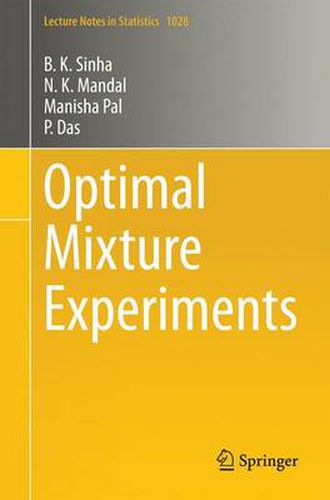Readings Newsletter
Become a Readings Member to make your shopping experience even easier.
Sign in or sign up for free!
You’re not far away from qualifying for FREE standard shipping within Australia
You’ve qualified for FREE standard shipping within Australia
The cart is loading…






This title is printed to order. This book may have been self-published. If so, we cannot guarantee the quality of the content. In the main most books will have gone through the editing process however some may not. We therefore suggest that you be aware of this before ordering this book. If in doubt check either the author or publisher’s details as we are unable to accept any returns unless they are faulty. Please contact us if you have any questions.
The book dwells mainly on the optimality aspects of mixture designs. As mixture models are a special case of regression models, a general discussion on regression designs has been presented, which includes topics like continuous designs, de la Garza phenomenon, Loewner order domination, Equivalence theorems for different optimality criteria and standard optimality results for single variable polynomial regression and multivariate linear and quadratic regression models. This is followed by a review of the available literature on estimation of parameters in mixture models. Based on recent research findings, the volume also introduces optimal mixture designs for estimation of optimum mixing proportions in different mixture models, which include Scheffe’s quadratic model, Darroch-Waller model, log- contrast model, mixture-amount models, random coefficient models and multi-response model. Robust mixture designs and mixture designs in blocks have been also reviewed. Moreover, some applications of mixture designs in areas like agriculture, pharmaceutics and food and beverages have been presented. Familiarity with the basic concepts of design and analysis of experiments, along with the concept of optimality criteria are desirable prerequisites for a clear understanding of the book. It is likely to be helpful to both theoreticians and practitioners working in the area of mixture experiments.
$9.00 standard shipping within Australia
FREE standard shipping within Australia for orders over $100.00
Express & International shipping calculated at checkout
This title is printed to order. This book may have been self-published. If so, we cannot guarantee the quality of the content. In the main most books will have gone through the editing process however some may not. We therefore suggest that you be aware of this before ordering this book. If in doubt check either the author or publisher’s details as we are unable to accept any returns unless they are faulty. Please contact us if you have any questions.
The book dwells mainly on the optimality aspects of mixture designs. As mixture models are a special case of regression models, a general discussion on regression designs has been presented, which includes topics like continuous designs, de la Garza phenomenon, Loewner order domination, Equivalence theorems for different optimality criteria and standard optimality results for single variable polynomial regression and multivariate linear and quadratic regression models. This is followed by a review of the available literature on estimation of parameters in mixture models. Based on recent research findings, the volume also introduces optimal mixture designs for estimation of optimum mixing proportions in different mixture models, which include Scheffe’s quadratic model, Darroch-Waller model, log- contrast model, mixture-amount models, random coefficient models and multi-response model. Robust mixture designs and mixture designs in blocks have been also reviewed. Moreover, some applications of mixture designs in areas like agriculture, pharmaceutics and food and beverages have been presented. Familiarity with the basic concepts of design and analysis of experiments, along with the concept of optimality criteria are desirable prerequisites for a clear understanding of the book. It is likely to be helpful to both theoreticians and practitioners working in the area of mixture experiments.